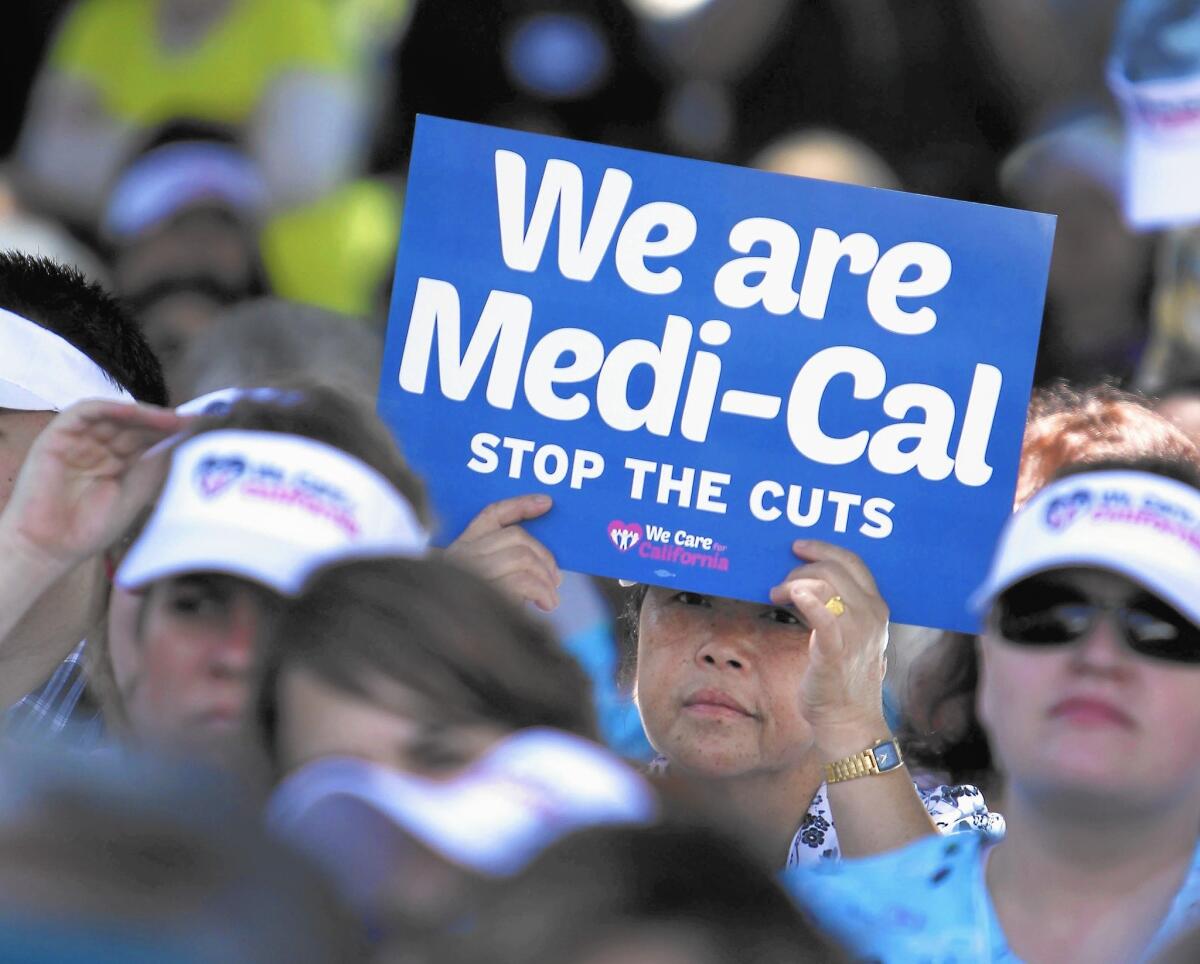Trump budget would reignite California’s financial strains

- Share via
Reporting from Washington — President Trump’s budget would deliver a painful financial blow to California, with the potential to push a state that has struggled for years to keep its books balanced back into the kind of red ink that consumed it after the housing market collapse a decade ago.
The only solace state and local officials are taking out of a White House budget plan that would cut most federal departments by about 10% to 12% is that even Republicans in Congress probably will find all the cuts on the table too hard to stomach.
The president’s blueprint would disrupt almost everything California does, in some cases quite brutally.
Millions would lose health insurance, police forces would be cut back, schools would face layoffs and cleanup of contaminated lands would be put off. Some of the state’s signature initiatives for the poor — such as the massive In-Home Supportive Services program, which provides care for the elderly and disabled, and the CalFresh food stamp program, which serves hundreds of thousands of needy residents — probably would have to be scaled back dramatically.
Federal housing programs that are the bedrock of a plan approved by Los Angeles voters to confront the region’s homelessness epidemic would be vastly reduced in size and ambition. The ability to respond to earthquakes and forest fires would be diminished, and college students struggling to pay tuition would get less help.
“I don’t think we have ever seen anything like this from the federal government,” said Mike Genest, who was director of finance for former Gov. Arnold Schwarzenegger. “Cuts of this magnitude would put the state’s budget into a level of difficulty and disarray we haven’t seen since the Great Recession. If I were still the director of finance, I would be sweating bullets right now.”
For all the positioning in Sacramento around standing up to the Trump administration and continuing liberal policies, the state is still deeply dependent on Washington. Federal dollars make up about a third of California’s state budget, much of it delivered in the form of Medicaid, the government health program for the poor and disabled.
And there are all the additional infusions of federal funds that aren’t reflected in the state budget but play a vital role to California’s economy, such as the food stamp funding and the Community Development Block Grants that go to cities and counties.
Even Trump’s plan to cut thousands of people from the Environmental Protection Agency threatens the state economy. San Diego officials are nervously contemplating what it could mean for the crucial federal Border 2020 program, which improves water and air quality and works to ensure waste is properly disposed of in both San Diego and Tijuana since pollution in each city affects the other. The importance of that effort was highlighted last month after a spill of more than 150 million gallons of raw sewage in Tijuana polluted San Diego water.
A major federal effort to protect and restore the San Francisco Bay would be eliminated altogether. Mayors and county executives are bracing for the backlog of contaminated properties awaiting cleanup to grow, even as an already strained EPA workforce is targeted by the Trump administration for thousands of job eliminations.
Trump budget director Mick Mulvaney said Wednesday the president’s budget was meant to fulfill his campaign pledges.
“He tried to shrink the role of government,” Mulvaney said. “If he said it on the campaign, it’s in the budget.”
But those who would endure the fallout are shaken. “I just don’t even know how we would function,” said Rep. Karen Bass (D-Los Angeles), who as a former Assembly speaker knows the California budget better than perhaps anyone in Washington.
[President Trump] tried to shrink the role of government. If he said it on the campaign, it’s in the budget.
— Mick Mulvaney, Trump budget director
While Trump’s final budget blueprint was not scheduled for release until Thursday morning, outlines offered by administration officials and leaked chapters of the plan had already put California communities in a state of high alert. The Trump budget would impose deep cuts in almost every nonmilitary federal agency to free up $54 billion for new spending on national defense.
It would eliminate scores of popular federal programs and dramatically reshape others. And it comes in tandem with Trump’s push to replace Obamacare with a Republican alternative that threatens to leave 5 million more Californians without insurance and cut $15 billion from the state’s $66-billion Medi-Cal budget within the next few years.
California advocates and budget analysts are hard-pressed to recall another time in history when the federal government has threatened to inflict so much fiscal damage on the state.
Some are reminded of Ronald Reagan’s early budgets, or welfare reform during the Clinton administration. But the financial turbulence created by those times would be dwarfed by the enactment of Trump’s budget. Aside from the many specific programs that would be eliminated outright or targeted for deep cuts, core services would suffer if agencies are ordered to shrink so dramatically.
Schools rely on an infusion of U.S. Department of Education funding, for example, to pay for programs for special-needs students. Many of those programs are required under state law, and schools could be forced to scramble for cash to cover them as Washington cuts back to cover military spending and fund new initiatives planned by the administration to expand charter schools. Genest said that could mean teacher layoffs.
The League of California Cities is lobbying fiercely to stop a proposal at Trump’s Department of Housing and Urban Development to eliminate Community Development Block Grants, on which its members depend to fund services such as building housing for the homeless and revitalizing decaying neighborhoods. Bass noted the signature Los Angeles program that voters approved to fight homelessness would be seriously undermined by Trump’s plans to eliminate thousands of Section 8 housing vouchers.
Mulvaney offered no indication the administration would reconsider. “The president said he would go after wasteful programs, duplicative programs, programs that simply don’t work, and a lot of those are in HUD,” he said.
But many Republicans in Congress are chafing at Trump’s budget blueprint, which targets programs popular with their constituents. Food stamps, for example, are utilized at far higher rates in most GOP-controlled states than they are in California.
That reluctance comes as a relief to many California leaders, but it also leaves them in limbo. Long after California’s June 30 deadline to balance its own budget, the fiscal fight in Washington will probably still be raging. And many in California’s congressional delegation worry a state that so closely aligned with the Obama White House is particularly vulnerable.
“I feel like there is particular emphasis on trying to punish California because we are ahead of the curve,” said Rep. Linda Sanchez (D-Whittier). “It’s not an accident that they are very cavalier about these cuts and how it will affect California and Californians.”
Follow me: @evanhalper
ALSO
The Pentagon wins and diplomacy loses in Trump’s ‘hard power’ budget
Here’s why the GOP is struggling to come up with a new healthcare plan: That wasn’t the goal
House intelligence chiefs say there’s no evidence that Obama wiretapped Trump
More to Read
Get the L.A. Times Politics newsletter
Deeply reported insights into legislation, politics and policy from Sacramento, Washington and beyond. In your inbox three times per week.
You may occasionally receive promotional content from the Los Angeles Times.










